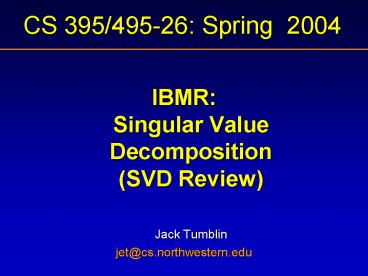CS 395/495-26: Spring 2004 - PowerPoint PPT Presentation
Title:
CS 395/495-26: Spring 2004
Description:
CS 395/495-26: Spring 2004. IBMR: Singular Value Decomposition (SVD Review) Jack Tumblin ... Zisserman Appendix 3, pg 556 (cryptic) Linear Algebra books ... – PowerPoint PPT presentation
Number of Views:14
Avg rating:3.0/5.0
Title: CS 395/495-26: Spring 2004
1
CS 395/495-26 Spring 2004
- IBMR Singular Value Decomposition(SVD Review)
- Jack Tumblin
- jet_at_cs.northwestern.edu
2
Matrix Multiply A Change-of-Axes
- Matrix Multiply Ax b
- x and b are column vectors
- A has m rows, n columns
x1 xn
a11 a1n am1 amn
b1 bm
b2
x2
x
b
Axb
b1
b3
x1
Input (N dim) (2D)
Output (M-dim) (3D)
3
Matrix Multiply A Change-of-Axes
- Matrix Multiply Ax b
- x and b are column vectors
- A has m rows, n columns
- Matrix multiply is just a set of dot-productsit
changes coordinates for vector x, makes b. - Rows of A A1,A2,A3,... new coordinate axes
- Ax a dot product for each new axis
x1 xn
a11 a1n am1 amn
b1 bm
A2
b2
x2
x
b
Axb
b1
A1
A3
b3
x1
Input (N dim) (2D)
Output (M-dim) (3D)
4
How Does Matrix stretch space?
- Sphere of all unit-length x ? ellipsoid of b
- Output ellipsoids axes are always perpendicular
(true for any ellipsoid) - THUS we can make -, unit-length axes
ellipsoid (disk)
b2
x2
b
x
Axb
b1
1
1
x1
b3
u2
u1
Input (N dim.)
Output (M dim.)
5
SVD finds Output Vectors U, and
- Sphere of all unit-length x ? ellipsoid of b
- Output ellipsoids axes form orthonormal
basis vectors Ui - Basis vectors Ui are columns of U matrix
- SVD(A) USVT columns of U OUTPUT basis
vectors
ellipsoid (disk)
b2
x2
b
x
Axb
b1
1
1
x1
b3
u2
u1
Input (N dim.)
Output (M dim.)
6
SVD finds Input Vectors V, and
- For each Ui , make a matching Vi that
- Transforms to Ui (with scaling si) si (A Vi)
Ui - Forms an orthonormal basis of input space
- SVD(A) USVT columns of V INPUT basis
vectors
b2
x2
x
b
v1
Axb
b1
v2
x1
b3
u2
u1
Input (N dim.)
Output (M dim.)
7
SVD finds Scale factors S.
- We have Unit-length Output Ui, vectors,
- Each from a Unit-length Input Vi vector, so
- So we need scale factor (singular values) si
to link input to output si (A Vi) Ui - SVD(A) USVT
s1
b2
x2
x
b
v1
Axb
b1
v2
x1
b3
s2
u2
u1
Input (N dim.)
Output (M dim.)
8
SVD Review What is it?
- Finish SVD(A) USVT
- add missing Ui or Vi, define these si0.
- Singular matrix S diagonals are si v-to-u
scale factors - Matrix U, Matrix V have columns Ui and Vi
b2
x2
x
b
u3
v1
Axb
b1
v2
x1
b3
u2
u1
Input (N dim.)
Output (M dim.)
A USVT Find Input Output Axes, Linked
by Scale
9
Let SVDs Explain it All for You
- cool! U and V are Orthonormal! U-1 UT, V-1
VT - Rank(A)? of non-zero singular values si
- ill conditioned? Some si are nearly zero
- Invert a non-square matrix A ? Amazing!
pseudo-inverse AUSVT A VS-1UT I
so A-1 V S-1 UT
b2
x2
x
u3
v1
Axb
b1
v2
x1
b3
u2
u1
Input (N dim.)
Output (M dim.)
A USVT Find Input Output Axes, Linked
by Scale
10
Solve for the Null Space Ax0
- Easy! x is the Vi axis that doesnt affect the
output (si 0) - are all si nonzero? then the only answer is x0.
- Null space because Vi is a DIMENSION--- x Vi
a - More than 1 zero-valued si? null space gt1
dimension... x aVi1 bVi2
b2
x2
x
u3
v1
Axb
b1
v2
x1
b3
u2
u1
Input (N dim.)
Output (M dim.)
A USVT Find Input Output Axes, Linked
by Scale
11
More on SVDs Handout
- Zisserman Appendix 3, pg 556 (cryptic)
- Linear Algebra books
- Good online introduction (your handout) Leach,
S. Singular Value Decomposition A primer,
Unpublished Manuscript, Department of Computer
Science, Brown University. http//www.cs.brown.edu
/research/ai/dynamics/tutorial/Postscript/ - Google on Singular Value Decomposition...
12
END































